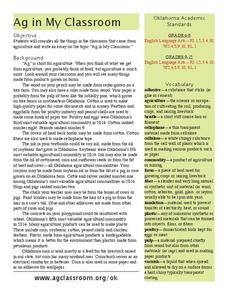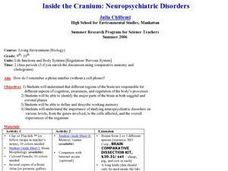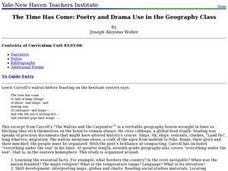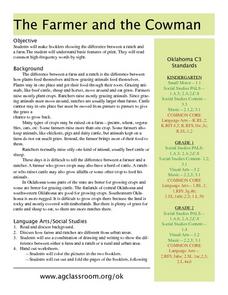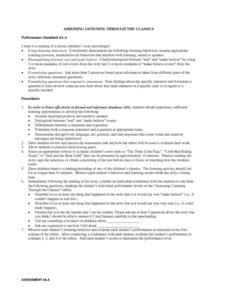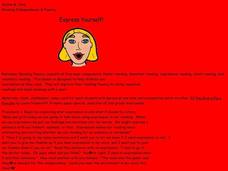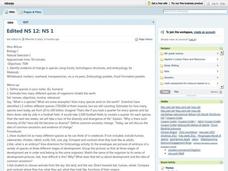Curated OER
Onomatopoeia Poems
Students write onomatopoeia poems. In this creative writing lesson, students listen to a picture book that introduces the concept of onomatopoeia. Students create their own list of words and write a short poem using onomatopoeia.
Curated OER
Ag in My Classroom
Students explore the definition of agriculture. In this Language Arts and Social Studies lesson, students read an article on products that are produced in agriculture, then they complete a vocabulary assignment and write an essay on the...
Curated OER
Minnesota Challenge
In this Minnesota worksheet, students answer multiple choice questions about Minnesota's history. Students answer 10 multiple choice questions.
Curated OER
A Meat By Any Other Name. . .
Students, using a New York Times article as a springboard, discuss how food reflects different aspects of a culture and reasons why cultural differences in food are seen as bizarre or, oftentimes, cruel by members of other societies.
Curated OER
The U.S. Trade Embargo on Cuba
Students examine perspectives for and against the U.S. trade embargo on Cuba, develop a position on the embargo and articulate viewpoints in a public forum.
Curated OER
Working Like a Dog
Students consider ways animals help human beings with certain chores, then research more specific tasks dogs are trained to do. They create a help wanted ad enumerating the traits a dog should have before applying for a particular position.
Curated OER
Sink or Float?
Students make and test predictions about sinking and floating, and classify objects according to whether they sink or float.
Curated OER
Story Quilt Project
Students investigate how quilt making was a family and community activity. They read and discuss books, complete various handouts, and create a paper quilt celebrating philanthropic activities.
Curated OER
Cold War
Eleventh graders analyze U.S. foreign policy since World War II, tracing origins and geopolitical consequences (foreign and domestic) of the Cold War and containment policy.
Curated OER
Changes in Western Art: From Realism To Cubism"
Students discover the influences of mid 19th and early 20th century art styles: Realism, Impressionism, Post / Neo Impressionism, Fauvism, Cubism through an analysis of styles, subject matter, and media.
Curated OER
1st Grade - Act. 11: Fairy Tale Riddles & Puppet Shows
First graders put on puppet show and retell fairy tales.
Curated OER
Inside the Cranium: Neuropsychiatric Disorders
Students analyze different regions of the brain which are responsible for different aspects of cognition, awareness and regulating the body's process.
Curated OER
The Time Has Come: Poetry and Drama Use in the Geography Class
Students use drama and poetry in their Geography class. In groups, they role play an interviewer or the interviewee in various plays that were presented to them. In their role, they must locate and label where the countries mentioned...
Curated OER
Lives of Native Americans and Settlers
Students assess the effect of contact between the Native Americans and Europeans after 1492. They explore the lives of the early European colonists and the Native Americans living along the East Coast of North America. Lesson contains...
Curated OER
The Farmer and the Cowman
What is the difference between a ranch and a farm? After reading and discussing the provided background information, young agriculturalists will color, cut, and create neat little booklets that show the differences between ranches and...
Curated OER
ASSESSING LISTENING THROUGH THE CLASSICS
Students demonstrate listening behaviors. They assume appropriate listening position, minimize/avoid behaviors that interfere with listening, and attend to speaker. They distinguish between real and make believe and cite 2 or more...
Curated OER
We Like to Imagine - Animals
Students describe a pretend animal. They read "The After School Monster." Students read other books and discuss whether or not the characters are real. Students make a drawing of a pretend animal and of a real animal. They make up a...
Curated OER
Sink or Float?
Students will determine whether various objects sink or float in water. They do not need to explain why objects sink or float. They are rather to be encouraged to observe that the same objects will sink or float every time, i.e., that...
Curated OER
It's Time to Rhyme
Students listen to rhyming book, identify rhyming pairs, guess what rhyme words mean, and create list of rhyming pairs on chart paper. They then discuss Fifty States Quarters Program, identify objects on backs of state coins, and...
Curated OER
Iggy is Icky Sticky
Second graders explore short vowels and their help in the development of phonemic awareness. They gain experience of the correspondence /i/. Students illustrate the correspondence by using memorable techniques used in showing /i/ in...
Curated OER
Express Yourself!
Students explore the five main components to reading fluency: faster reading, smoother reading, expressive reading, silent reading and voluntary reading. This lesson is designed to help children use expression as they read. Improvement...
Curated OER
Word Family Jamboree
Students explore rhyming words, beginning and ending sounds. In this word family lesson, students identify beginning and ending sounds. Students draw pictures of words and use phonetic spellings to write stories. Students use Dr. Seuss...
Curated OER
Natural Selection
Students estimate how many different species of organisms inhabit the Earth. In groups, they match the pictures of embryos at the different stages of development. They compare and contrast animals from the sky, land, and water and...
Curated OER
The Clone Age
Students relate the ethical and practical arguments in favor of cloning and against cloning. They research the issue and plan a public service advertisement campaign for or against cloning.
Other popular searches
- Guinea Pigs
- Three Little Pigs
- Bay of Pigs
- The Three Little Pigs
- Three Little Pigs Money Math
- 3 Little Pigs
- Pigs Will Be Pigs
- Three Pigs
- The 3 Little Pigs
- Bay of Pigs Invasion
- The Three Pigs
- Pigs on a Blanket



